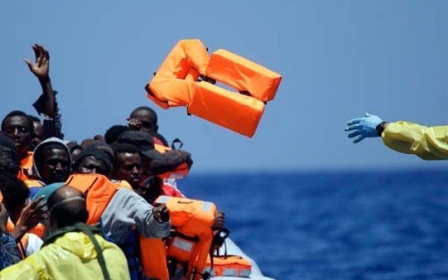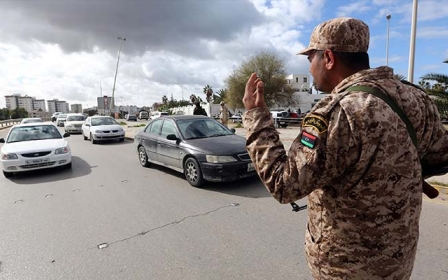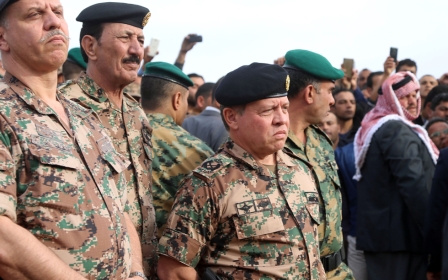Libya's unity leader promises to 'turn the page' after arrival in capital

The leader of Libya's unity government arrived in Tripoli promising to "turn the page" on the country's troubled post-Gaddafi era despite opposition to its authority from two rival parliaments already vying for control.
Fayez al-Sarraj, named prime minister-designate under a UN-brokered power-sharing deal, arrived from Tunisia on Wednesday with six deputies to set up a temporary seat of power in a naval base.
The six deputies are members of the Presidential Council, which was established based on a UN-mediated deal signed by splinter groups from the two parliaments last year. The council formed the new unity government headed by Sarraj.
Sarraj faced immediate challenges to his authority with Khalifa Ghweil, the prime minister of Tripoli's General National Congress, calling his government illegal and urging Sarraj to leave or turn himself in.
Sarraj and other officials were prevented from flying into Tripoli by a rival parliament based in the capital, with authorities even closing the airspace several times.
A third parliament, based in Tobruk in the east, also has not ratified the UN-backed administration.
"It is time for all of us as Libyans to work together for the sake of Libya," Sarraj said upon his arrival, according to his government's Facebook page.
He urged rivals to "turn the page of the past," saying "revenge, alienation, antipathy, and hatred don't build a state".
Martin Kobler, the UN's special envoy to Libya, tweeted support for Sarraj and called on all institutions in Libya to "facilitate [an] immediate, orderly and peaceful handover of power.
"I commend the courage, determination and leadership of the Presidency Council under its president Fayez Serraj in moving forward with the implementation of the Libyan political agreement and the aspiration of the overwhelming majority of the Libyan people. The international community stands firmly behind them and is ready to provide the required support and assistance," Kobler said.
The European Union's foreign affairs chief Federica Mogherini expressed support for Sarraj, calling his arrival in Tripoli "a unique opportunity for Libyans of all factions to reunite".
Italy, which has offered to lead a peacekeeping force in Libya if asked by the new government, also welcomed the development.
"It is another step forward for the stabilisation of Libya," Foreign Minister Paolo Gentiloni said.
"Further progress is now possible for the Libyan people based on the determination of premier Sarraj and the presidential council."
The United States welcomed the arrival in Tripoli of the head of Libya's UN-backed unity government despite demands by a rival faction that he leave.
"The Government of National Accord can now begin the crucial work of addressing the full range of Libya’s political, security, economic, and humanitarian challenges," Kerry said in a statement.
Early on Wednesday, several loud explosions followed by heavy gunfire were reportedly heard in the capital, a day after the Presidential Council, which had been based in Tunis, blamed the Tripoli-based government for the closures at the Matiga airport.
The council was formed in December as a result of the UN process agreed by participants from the Tobruk-based House of Representatives, the Tripoli-based General National Congress and members of Libyan civil society.
However, both parliaments have rejected the new authority headed by Sarraj. Members of the Tripoli government and some armed factions in the capital had warned members of the council to stay away from the country.
Last week, the Tripoli government announced a "maximum state of emergency" after Sarraj said the government would soon start working in the capital.
Fearing that fighting would break out, residents stocked up on food in preparation. "No more than 10 cans of tuna per person," one shop sign read.
Residents jokingly shared the "news flash" that militias had set up a giant fan in the desert to create a sandstorm to prevent Sarraj's plane from landing. One caricature circulating on Twitter showed the prime minister-designate arriving under a UN-marked parachute.
Late on Tuesday, UN chief Ban Ki-moon pleaded for the unity government to be allowed to start work quickly and called for anyone obstructing the peace process to be held accountable.
Ban, speaking in Tunisia, called for a UN-backed presidential council to be permitted to work towards "the immediate peaceful and orderly handover of power to the government of national accord".
"Those obstructing the political process should be held accountable. The Libyan people deserve peace, security and prosperity under a strong, united government," he said.
World powers are pressing all sides in the Libyan conflict to accept the UN-brokered deal amid concerns the Islamic State (IS) militant group is gaining influence in the country.
Western nations are openly considering military intervention against the militants, but diplomats and officials have previously said that they would wait for a request from the unity government.
However, as Middle East Eye first reported, Britain has already launched covert military operations in the country with the support of Jordan. The US has also been conducting drone strikes on IS targets in the country.
"There are many countries who really wish that Libya now establishes the government of national accord so that we can help them, so that they can establish their country with peace and security," Ban said.
"Terrorism poses a great threat not only in Libya and Tunisia but all around the world as we have seen in the past few days in Belgium, Iraq and Pakistan. We need a united global approach."
Stay informed with MEE's newsletters
Sign up to get the latest alerts, insights and analysis, starting with Turkey Unpacked
Middle East Eye delivers independent and unrivalled coverage and analysis of the Middle East, North Africa and beyond. To learn more about republishing this content and the associated fees, please fill out this form. More about MEE can be found here.




